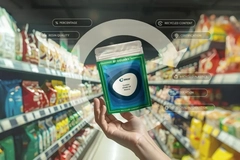
Clemson University’s Sustainable Packaging Innovation Lab (SPIL) in the US is boosting packaging R&D for specialty crops to accelerate competitiveness on the EU, Canadian, and US markets amid stringent regulatory developments.
SPIL has invested US$2.5 million to support the development of environmentally sustainable packaging solutions.
The project focuses on the EU and Canadian markets, where new regulations phase out single-use plastic. They also require recyclable or compostable alternatives for produce packaging.
“This lab is all about enabling US specialty crop exporters to succeed in markets that now demand sustainable packaging,” says James Sternberg, assistant professor of sustainable packaging at Clemson and a leader of the initiative.
“We’re building the future of ag packaging with real-world technologies that ensure compliance and competitiveness.”

A passport to global markets
The US$143 billion specialty crop export industry faces challenges as foreign regulations become increasingly complex, according to the innovation lab.
SPIL-funded solutions offer export-ready packaging that meets Canada’s and Europe’s single-use plastic bans, requirements for recycled content, and mandates for compostable materials.
“Packaging is no longer just a container — it’s a passport to global markets,” says Andrew Hurley, director of research for Clemson Fresh. “With SPIL, we’re helping exporters navigate regulatory complexity with confidence and agility.”
SPIL is funded through the USDA Foreign Agricultural Service’s US$5 million Sustainable Packaging Innovation Lab at Clemson University and launched through the Assisting Specialty Crop Exports initiative.
Regulatory landscape
New regulations, such as the EU’s Packaging and Packaging Waste Regulation (PPWR), aim to eliminate single-use and small-quantity packaging in favor of bulk bins for produce under 1.5 kg.
Meanwhile, plastic used in packaging must contain more post-consumer recycled content under PPWR. Regulations also seek to eliminate shrink wrap and require compostable labels on produce, so everything can be composted together, enhancing sustainability.
Currently, UN member states are meeting in Switzerland to establish a UN Global Plastic Treaty to reduce plastic waste globally and strengthen packaging circularity.












